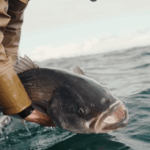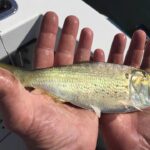
No, Striped Bass Are Not “Back” in North Carolina
This week, an Axios Raleigh article made the rounds claiming there may have been a
By Tony Friedrich, VP/Policy Director
Tomorrow, May 4th, beginning at 11:30am, the Atlantic States Marine Fisheries Commission’s (ASMFC) Striped Bass Management Board will consider approval of Draft Amendment 7 and in doing so determine the future of striped bass. We at ASGA would like to extend a heartfelt thanks to everyone who participated in the process because the community support was nothing short of incredible.
We wanted to give a rundown of the public comment along with numbers that jumped out at us. The public’s participation was nothing short of remarkable; as you can imagine, it took us a little time to read the 2179 pages. If the outcome of tomorrow’s meeting doesn’t represent a clean sweep for conservation, this will be the final nail in the coffin for the Striped Bass Board’s—and ASMFC’s—credibility. For those who would rather listen than read, we recently sat down with Mike Woods from Backcountry Hunters and Anglers to review what the public had to say regarding Draft Amendment 7 on the most recent episode of The Guide Post.
While it might be nice to sit around the table as an ASMFC commissioner, ignore the public, and do whatever you want, our members need sustainable fisheries to operate their businesses. We did everything we could to prove that by getting almost 100 companies and organizations to sign on to our Draft Amendment 7 letter along with generating over 500 personally written comments. If ASMFC wants to see what a real lack of faith looks like, I dare them to ignore these efforts.
Let’s talk about Conservation Equivalency (CE) for a second. We were told by several commissioners that this was the most important section for anglers to weigh in on. There were a paltry 153 comments in support of CE remaining in place with no changes—i.e., status quo. That covers both written comments as well as the state hearings. Meanwhile, there were 4,246 comments in favor of restrictions based on stock status. 3.5% of responders think CE shouldn’t change. That means 96.5% of the public thinks CE needs additional guardrails. That’s about as close to consensus as it gets for a fisheries issue with this sort of complexity.
Some of y’all might remember when New Jersey made a motion during the Addendum VI process that each state should take an equal 18.5% reduction to lower striped bass removals rather than have the states that harvest the most take the biggest hit. New Jersey’s motion was made at the end of the meeting and commissioners were tired. Many didn’t realize that if New Jersey—the largest recreational harvester on the coast—didn’t take a bigger reduction, it was doubtful that we could meet our reduction goal. Well, the states collectively did meet the coastwide reduction but lo and behold, New Jersey fell short of its goal. Section E from the CE portion of Draft Amendment 7 covered this issue. 1,357 comments said New Jersey should not get away with this again. Four—I repeat, four—supported New Jersey’s tomfoolery. That equates to 99.7% of comments supporting what is fair. Now, how many times in your life have you ever seen 99.7% of 1361 comments in agreement?!
How did the public respond to rebuilding the stock (Section 4.4.2) should further measures be needed following the 2022 stock assessment? 4,047 supported Board action (a faster response) vs. 14 supporting a full Addendum process (slower with more input). How about standard vs. low recruitment assumption for rebuilding (Section 4.4.1)? 4,052 supported assuming low recruitment vs. 12 supporting status quo.
What about the triggers? 4,124 wanted to maintain the status quo of reducing fishing mortality to the target within year, while only 25 supported changing it to two years. Reduce fishing mortality to target within one year vs. 2 years. 4,093 supported the status quo of using one year of data to determine if overfishing was occurring, while only 17 supported changing it to a two-year average. Do we need to go on? Because we could.
The last thing we would like to point out is the letter from three state Attorneys General. It is in the supplemental materials on page 209. The effort was led by Connecticut, with Massachusetts and Rhode Island joining the fight. We can’t thank these offices enough for submitting this powerful letter. I don’t know about you, but I am not fond of getting an email from an Attorney General, much less three. You have to wonder what the reaction was at ASMFC when this came in. It must be jarring to realize that you are doing such a poor job at managing fish that you attracted the attention of three Attorney General offices. If you are a resident of one of those states, send those offices an email thanking them (CT, MA, and RI). It isn’t often that we get the attention of folks on this level. Let’s show them that we appreciate their support.
We did our job. You did your job. Fishing businesses did their job. Now, will ASMFC do their job?

This week, an Axios Raleigh article made the rounds claiming there may have been a

Feature Photo Credit: Robbie Tartaglia What’s going on? For decades, striped bass management relied on a

Recent developments in the 2025 Atlantic Menhaden Stock Assessment Update, released by the Atlantic States

What’s going on? The “most important fish in the sea” just exposed one of the
We rely on our members and donations to keep fighting for a sustainable tomorrow in marine conservation.
GIVE THE GIFT OF FISHERIES CONSERVATION THIS HOLIDAY SEASON. SHOP ASGA GOODS THAT FUND FISHERIES RESEARCH & ADVOCACY CAMPAIGNS
JOIN ASGA IN CALLING FOR CRITICAL MANAGEMENT ACTION AFTER YEARS OF SPAWN FAILURES & POOR MANAGEMENT.
By using this website, you agree to our use of cookies. We use cookies to provide you with a great experience and to help our website run effectively. To learn more, please review our privacy policy.
2 Responses
As usual those invested in this sport, business etc know what’s needed. If Asmfc can’t man up and realize they are behind the eight ball on this issue they should be terminated! When there are no fish they won’t be needed!